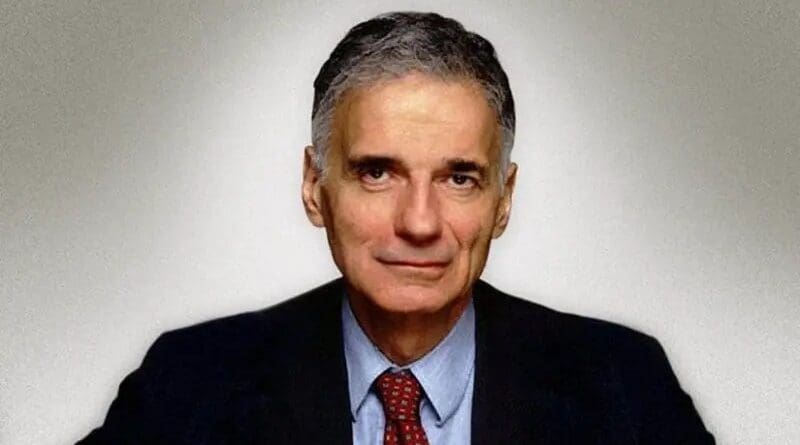Ralph Nader: The Balancing Tensions Of Ashraf Ghani – OpEd
By Ralph Nader
Ashraf Ghani, the thoughtful new president of Afghanistan, came to Washington last week and the trip probably met his expectations. He wanted to thank the United States for “defending freedom” in his country and he did this more profusely than any foreign leader in recent history.
He thanked the Congress, President Obama, the generals, the soldiers, the civic affairs specialists, the diplomats, the taxpayers of America and so on. If this came across as excessive flattery toward our government, which after all committed many atrocities and preventable casualties and destruction, President Ghani had a purpose. He wanted to erase the acrimonious legacy of U.S. relations with his predecessor, Hamid Karzai, and lay the foundation for the continued presence of 10,000 U.S. soldiers plus thousands of contractors and economic assistance to give his government some breathing room.
Recommended Video
The Congress responded to this former professor of anthropology at Johns Hopkins University in Maryland and former official of the World Bank in Washington with a standing ovation, though far shorter than the one that the fire-breathing Israeli Prime Minister, Benjamin Netanyahu received earlier this month.
During his three days in Washington, President Ghani soothed fears and raised his profile. America has done no wrong in his presentations, which also included praise for the imperial Senators John McCain and Lindsay Graham.
His address before the joint session of Congress covered a wide range of plans and activities. He spent about ten minutes on the advances made by Afghan girls in school, of women voting more and of the advances in providing a constitutional, equal opportunity and cultural basis for the emergence of women not just as a matter of human rights but of “national necessity.”
He embraced globalization while emphasizing self-reliance—without noting the contradictions that would be forthcoming in such a stance, especially with the “harmonization” promoted by the World Trade Organization and its sanctions-based corporatist governance.
The “real” Ashraf Ghani emerged at various points of his Congressional speech. He spoke about the budding partnership with the U.S. and its regional neighbors that would start “to balance the focus on security (he did not avoid using the words “extremism” and terrorism”) with “a new emphasis on the rule of law and justice [one of his favorite words], growth in the pursuit of peace and reconciliation.” He painted a vision of what his country could be like with the “politics of unity.” He described the geographical beauty of Afghanistan and envisioned a future with Americans visiting his country as tourists and partners.
He spoke extensively of peace, but noted that Afghans know how to fight and have triumphed over most of the empires that have invaded them over the centuries. Then he asked: “Who is entitled to speak for Islam? Leaders, intellectuals and those many millions of Muslims who believe that Islam is a religion of tolerance and virtue must find their voice. Silence is not acceptable. But silence is not what the world will hear from us. Afghanistan is joining a new consensus that’s emerging in the Muslim world, a consensus that rejects intolerance, extremism and war. They have documented beautifully central Asia’s long tradition of rationalism and scientific inquiry.”
He acknowledged the depths of poverty in his country and the “corruption and impunity” that permeate the government and have to be rooted out. President Ghani is arguably the world’s leading expert on the intricacies and functions of widespread corruption in poor countries, which may explain his appointing someone accused of a corrupt past to head his anti-corruption agency.
He stressed that waging peace requires diplomacy, a strong army and a serious initiative for national reconciliation. He used these words for the insurgents: “The Taliban need to choose not to be al-Qaeda. And if they choose to be Afghan, they will be welcomed to be part of the fabric of our society. Many believe themselves to be patriots against the corruption and criminality that they saw in their towns and villages.”
These words illustrate the empathy and inclusiveness that mark the presidency of Ashraf Ghani. He sees hostilities through the lens of grievances by others. He strives to include former adversaries or tribal leaders in his government—starting with his vice-president—and he rarely publically resorts to harsh language against his critics or enemies.
Above all, President Ghani wants to neutralize anybody or anything that undermines or distracts from his focus on building trust in government through trusted, competent public servants, of encouraging autonomy down to the village level through self-reliance and of amassing the natural resources of his country for public benefit rather than for unfettered multinational corporate exploitation.
To get the job done, he will flatter, invite, partner and overwhelm those presenting obstacles with a pragmatism that relies on a steely determination so as to avoid such tactics becoming self-betrayal. This is a tall order in a very difficult arena.
Two issues were neglected in this otherwise compelling speech. First, President Ghani’s wide-ranging speech could have helped lay better the basis for regional peace if he had briefly advised Congress to press for an Israeli/Palestinian two-state solution by recognizing the repeated 2002 invitation to Israel by a coalition of many Arab and Islamic nations for a comprehensive, durable peace in accordance with the long-ignored United Nations resolutions.
Second, he declined to mention the U.S./Iranian confrontations in historical and contemporary ways that he is superbly able to explain. Our government would benefit greatly by seeking his advice on what our relations with Iran could be. Never mentioning Israel, Palestine and Iran within a gracious speech of great praise of the U.S. was however an unfortunate strategic omission and a lost opportunity.
He might have earned more lasting respect for his erudition and candor among significant segments of American opinion had he done so.

